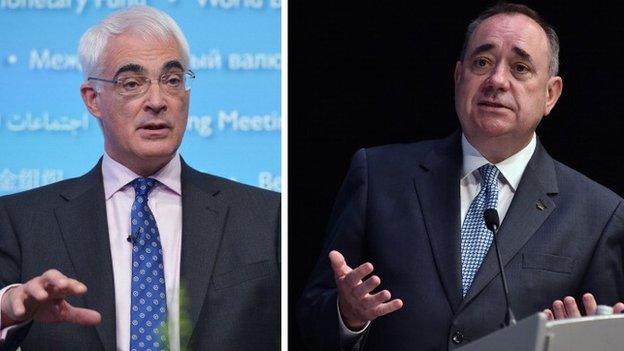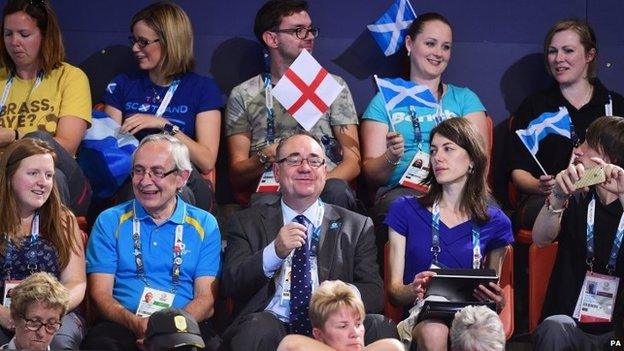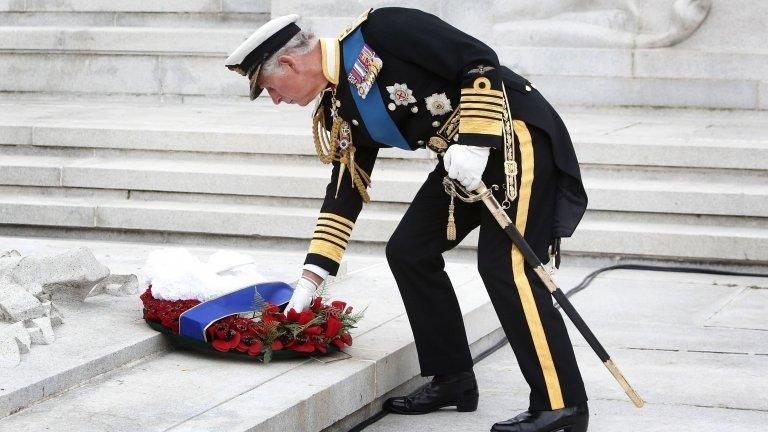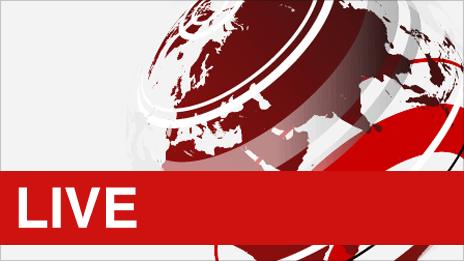Referendum debates: 'Bring it on'
- Published

Alistair Darling and Alex Salmond will debate on STV at 20:00 on Tuesday
And so Jack McConnell got his way after all. There was, in practice, a truce during the Commonwealth Games - at least in terms of high-profile conflict via the media.
If you remember, the former First Minister drew mild contumely when he first suggested that the two campaigns might give it a rest and concede the field to those who run, jump, swim, box and otherwise compete athletically.
In the event, the sheer scale of the Games, the huge public enthusiasm, simply swamped the referendum.
Warm congratulations to all those - athletes, organisers, volunteers, workers of all kinds, the attending public - who made the games an enormous success: a concatenation of enthused well-being.
Congratulations too to the political leaders and campaigns who displayed elementary good sense in allowing the referendum campaign to be subsumed to a large degree.
But now the Games have moved on, to wash up on the shores of the Gold Coast in four years time. It is back - with vigour and, one hopes, comparable public enthusiasm - to the referendum.

First Minister Alex Salmond watches the diving at the Royal Commonwealth Pool in Edinburgh
Certainly, I have never known the populace of Scotland to be so engaged in a political debate. That is because the choice is big, it is significant, it is directly related to popular concerns - and it is personal. It is a choice to be taken by each individual. Every vote genuinely counts.
This is a new and final phase. It is a little like a householder who has placed a bill or an important letter on the mantelpiece. They know the contents. They've had a glance, perhaps repeatedly. They've had a think. But now they know they have to make up their mind as to how to act, as to what to do. They have to decide.
That decision will be influenced by a range of factors: the information available; family and workplace conversations; trust; instinct. Some of the information featuring in that choice will come through the media - Online, on the wireless, on the telly; through news coverage, through special programmes, through documentaries and through televised debates.
Tonight brings the first of the head-to-head debates between Alex Salmond and Alistair Darling. There will, we are assured, be others. Mr Salmond had wanted to contest the Prime Minister but has agreed to a prosaic flyting with Mr Darling.
Couple of caveats. This is not like a Presidential or Prime Ministerial debate. Mr Salmond and Mr Darling are not rivals for high office.
That alters the tone of the discussion. In a contest for high office, the contenders must display their personal capacity, their aptitude. They are seeking, after all, to reassure the voters that they can cope with whatever arises, with "events". That they can lead.
That means they must do much more than evangelise their manifesto programmes. They must say: back me, I'm better than the other one(s).
This is different. Both Alistair Darling and Alex Salmond are arguing conceptually, rather than personally. They are arguing for the merits of independence versus the Union. Leadership is not central.
Popular support
In particular, the First Minister wants to stress that the choice of independence is about the people of Scotland: not him. He wants to emphasise it is not a vote for him. It is an endorsement of independence - or otherwise - not of his leadership.
Either Mr Salmond or Mr Darling could "win" the debate - in the sense of seemingly besting his opponent - yet shed popular support as a consequence, if viewers dislike the nature of that apparent victory.
Further, folk may seize - positively or negatively - upon an individual aspect of the exchange. About pensions or the economy or sport or… Remember, this is a personal choice, driven by personal concerns.
Second caveat. Televised debates do not determine, finally, the outcome of contests. If that were ineluctably so, then Nick Clegg would be Prime Minister now, following his fired-up performances in 2010. Last time I checked…..
However, such debates contribute substantially to the momentum of the campaign. They may energise or depress the competing sides. They may generate issues which are then promulgated and discussed around the doorsteps.
To borrow a phrase from the Games, bring it on.
- Published4 August 2014

- Published4 August 2014
